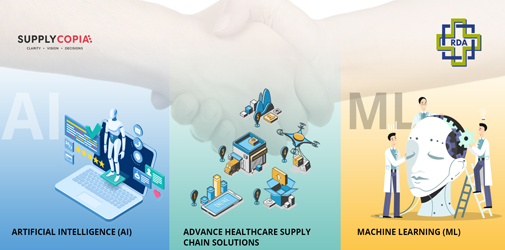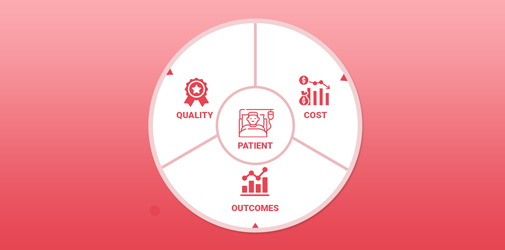October 7, 2025
Three Critical Healthcare Supply Chain Topics
Where SupplyCopia's Virtual Item Master Can
Drive Solutions in 2025
AI-Powered Supply Chain Automation & Data Interoperability Crisis
Market Challenge & Scale
We see firsthand how healthcare organizations are trapped in a maze of disconnected systems. These silos don’t just slow things down—they create blind spots that can compromise patient care. The numbers are alarming: 92% of US healthcare organizations faced cyberattacks last year, 30% of item master systems are inaccurate, and nearly a quarter of supply chain staff time goes into fixing errors that should never have happened.
This isn’t just about cybersecurity. When scheduling systems don’t know about shortages, surgeries get rescheduled. Each delay costs hospitals thousands and adds unnecessary stress for patients. Collectively, hospitals waste $25.7 billion every year on supply chain inefficiencies.
1. Current Market Reality in 2025
Right now, healthcare supply chains are at a turning point. AI and generative AI rank at the top of digital investment priorities, but confidence is low—only 28% of supply chain professionals feel equipped to tackle complex challenges.
Outdated systems are the core problem. Many hospitals run advanced cloud-based ERPs in supply chain while still relying on outdated point systems in clinical inventory. Without interoperability, data can’t move, and automation falls flat.
SupplyCopia’s Solution Advantage
This is where we come in. Our Virtual Item Master is built to resolve the interoperability crisis at its root. By pulling data from 200+ source systems and updating 3.5 million SKUs daily, we create a single source of truth that integrates seamlessly with ERP, MMIS, and EMR/EHR systems.
What sets us apart:

- Advanced AI that maps data across disparate systems
- Machine learning and natural language processing that keep data accurate
- Real-time inventory visibility for proactive decisions
- Functional equivalency mapping for instant product alternatives
The results speak for themselves. Organizations adopting interoperability solutions like ours have cut the time clinical staff spend searching for supplies by 80–90%, dramatically reducing costly rescheduled procedures.
2. Escalating Supply Chain Cost Inflation & Risk Management
Market Challenge & Scale
Healthcare supply chain costs are rising faster than ever. Medical supply chain costs are projected to increase by 2.41% in 2026, fueled by IT services, capital equipment, and surgical supplies. Tariffs are adding more strain—US tariffs on Chinese medical-surgical products now reach as high as 245%.
Between July 2025 and June 2026, costs are expected to climb another 2.3%, driven by materials prices, shipping expenses, and tariffs on critical items like enteral syringes, face masks, and gloves. Hospital services costs have already surged by 3.9%—well above general inflation—and non-labor expenses rose 10% in 2024.
Current Market Reality in 2025
Most healthcare leaders agree the outlook isn’t getting better. 69% believe supply chain challenges will stay the same or worsen this year, and more than half expect higher cost savings targets in 2025 compared to 2024. Yet only a third feel confident in their ability to accurately track those savings.
For organizations still dependent on Chinese suppliers, the risks are even greater. Black Book Market Research found that 76% of healthcare providers faced disruptions lasting more than six months after past tariff changes.
SupplyCopia’s Solution Advantage
We designed our Virtual Item Master to tackle inflationary pressures head-on. The platform reduces Item Master Management costs by 50% and consistently delivers 15–20% savings across deployments.
Here’s how:

- Functional equivalency mapping to uncover lower-cost, quality-assured alternatives
- Daily data updates from 200+ sources for clear pricing visibility
- 110+ analytical levers to detect anomalies automatically
- Cross-reference tools that balance cost savings with compliance and quality
We’ve rolled out these capabilities across more than 100 hospitals in 10 countries. Within 4–6 weeks, organizations start seeing cost savings with accuracy rates improving by 95%.
That’s real impact, not projections.
3. Regulatory Compliance Complexity & ESG Sustainability Reporting
Market Challenge & Scale

Healthcare faces one of the most complex regulatory landscapes in any industry. In 2022 alone, over 350,000 regulatory alerts were recorded globally. Compliance isn’t optional—it’s mission critical. Add to that the fact that healthcare accounts for 4.4% of global CO2 emissions, and 84% of those emissions come from supply chain-related activity.
From FDA and GDP compliance to emerging ESG standards, the burden is heavy. Non-compliance means fines, safety risks, and reputational damage. The manual effort required to manage compliance and sustainability reporting is overwhelming.
Current Market Reality in 2025
With the Corporate Sustainability Reporting Directive (CSRD) kicking in, large organizations must start disclosing sustainability data for 2025, with reports due in 2026. This means hospitals need to produce more detailed documentation than ever, while also juggling operational pressures.
The complexity of ESG is particularly tough. It requires collaboration across multiple tiers of the supply chain, from raw material suppliers to final healthcare providers, covering everything from ethical labor practices to carbon impacts.
SupplyCopia’s Solution Advantage
Our Virtual Item Master is built for compliance and ESG tracking at scale. By analyzing 30–160 attributes per product, we help organizations ensure regulatory alignment and sustainability oversight.
We track and manage:
- UNSPSC, HCPCS, ICD-10, CPT, GTIN, GMDN, NDC, ATC codes
- Manufacturer and distributor details for full transparency
- Sustainability and ESG metrics through integration with 200+ data sources
The system’s automation capabilities are key:
- Machine learning flags compliance risks in real time
- Automated reports reduce manual documentation burden
- Lifecycle management supports circular economy initiatives
- Blockchain and RFID add layers of authentication and traceability
By providing a comprehensive global product database, we give healthcare organizations the confidence to verify product authenticity, track compliance, and make sustainable sourcing decisions without adding to staff workload.
Contact Us today.
Team SupplyCopia
More from SupplyCopia



 ALL Solutions
ALL Solutions 
